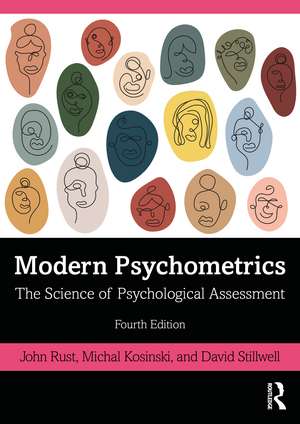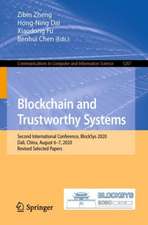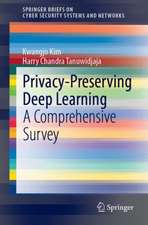Modern Psychometrics: The Science of Psychological Assessment
Autor John Rust, Michal Kosinski, David Stillwellen Limba Engleză Paperback – 24 dec 2020
Rust, Kosinski, and Stillwell begin with a comprehensive introduction to the increased sophistication in psychometric methods and regulation that took place during the 20th century, including the many benefits to governments, businesses, and customers. In this new edition, the authors explore the increasing influence of the internet, wherein everything we do on the internet is available for psychometric analysis, often by AI systems operating at scale and in real time. The intended and unintended consequences of this paradigm shift are examined in detail, and key controversies, such as privacy and the psychographic microtargeting of online messages, are addressed. Furthermore, this new edition includes brand-new chapters on item response theory, computer adaptive testing, and the psychometric analysis of the digital traces we all leave online.
Modern Psychometrics combines an up-to-date scientific approach with full consideration of the political and ethical issues involved in the implementation of psychometric testing in today’s society. It will be invaluable to both undergraduate and postgraduate students, as well as practitioners who are seeking an introduction to modern psychometric methods.
| Toate formatele și edițiile | Preț | Express |
|---|---|---|
| Paperback (1) | 407.19 lei 6-8 săpt. | |
| Taylor & Francis – 24 dec 2020 | 407.19 lei 6-8 săpt. | |
| Hardback (1) | 1000.27 lei 6-8 săpt. | |
| Taylor & Francis – 24 dec 2020 | 1000.27 lei 6-8 săpt. |
Preț: 407.19 lei
Nou
Puncte Express: 611
Preț estimativ în valută:
77.91€ • 81.35$ • 64.49£
77.91€ • 81.35$ • 64.49£
Carte tipărită la comandă
Livrare economică 04-18 aprilie
Preluare comenzi: 021 569.72.76
Specificații
ISBN-13: 9781138638655
ISBN-10: 113863865X
Pagini: 194
Ilustrații: 8 Tables, black and white; 19 Line drawings, black and white; 19 Illustrations, black and white
Dimensiuni: 174 x 246 x 15 mm
Greutate: 0.24 kg
Ediția:4th edition
Editura: Taylor & Francis
Colecția Routledge
Locul publicării:Oxford, United Kingdom
ISBN-10: 113863865X
Pagini: 194
Ilustrații: 8 Tables, black and white; 19 Line drawings, black and white; 19 Illustrations, black and white
Dimensiuni: 174 x 246 x 15 mm
Greutate: 0.24 kg
Ediția:4th edition
Editura: Taylor & Francis
Colecția Routledge
Locul publicării:Oxford, United Kingdom
Public țintă
Postgraduate and UndergraduateCuprins
1. The history and evolution of psychometric testing
Introduction
What is psychometrics?
Psychometrics in the 21st century
History of assessment
2. Constructing your own psychometric questionnaire
The purpose of the questionnaire
Making a blueprint
Writing items
Piloting the questionnaire
Item analysis
3. The Psychometric principles
Reliability
4. Psychometric measurement
True-score theory
Identification of latent traits with factor analysis
Criticisms of psychometric measurement theory
5. Item response theory and computer adaptive testing
Introduction
Item banks
Summary of item response theory
Confirmatory factor analysis
6. Personality theory
Theories of personality
State versus trait measures
Ipsative scaling
Spurious validity and the Barnum Effect
Summary
7. Personality assessment in the workplace
Prediction of successful employment outcomes
8. Employing digital footprints in psychometrics
Introduction
Types of digital footprint
9. Psychometrics in the era of the intelligent machine
History of computerization in psychometrics
Introduction
What is psychometrics?
Psychometrics in the 21st century
History of assessment
- Chinese origins
The ability to learn
The nineteenth century
- Intelligence testing
Eugenics and the dark decades
- The dark ages come to an end
An abundance of abilities
- Personality
Integrity
Interests
Motivation
Values
Temperament
Attitude
Belief
2. Constructing your own psychometric questionnaire
The purpose of the questionnaire
Making a blueprint
Writing items
- Alternate-choice items
Multiple-choice items
Rating-scale items
All questionnaires
Knowledge-based questionnaires
Person-based questionnaires
Piloting the questionnaire
Item analysis
- Facility
Discrimination
Distractors
- Cronbach’s alpha
Split-half reliability
- Face validity
Content validity
3. The Psychometric principles
Reliability
- Test-retest reliability
Parallel-forms reliability
Split-half reliability
Interrater reliability
Internal consistency
The standard error of measurement (SEM)
Comparing test reliabilities
Restriction of range
- Face validity
Content validity
Predictive validity
Concurrent validity
Construct validity
Differential validity
- Norm referencing
Criterion referencing
- Differential item functioning
Measurement invariance
Adverse impact
4. Psychometric measurement
True-score theory
Identification of latent traits with factor analysis
- Spearman’s two-factor theory
Vector algebra and factor rotation
Moving into more dimensions
Multidimensional scaling
- Eigenvalues
Identifying the number of factors to extract using the Kaiser criterion
Identifying the number of factors to extract using the Cattell scree test
Other techniques for identifying the number of factors to extract
Factor rotation
Rotation to simple structure
Orthogonal rotation
Oblique rotation
Criticisms of psychometric measurement theory
- The Platonic true score
Psychological vs. physical true scores
Functional assessment and competency testing
Machine learning and the black box
5. Item response theory and computer adaptive testing
Introduction
Item banks
- The Rasch model
Assessment of educational standards
The Birnbaum model
- Computer adaptive testing
Item equating
Polytomous IRT
- Limitations of classical test theory
- The logistic curve
3PL-model: difficulty parameter
3PL model: discrimination parameter
3PL model: guessing parameter
The Fisher information function
The test information function and its relationship to the standard error of measurement
How to score an IRT test
Summary of item response theory
Confirmatory factor analysis
6. Personality theory
Theories of personality
- Psychoanalytic theory
Humanistic theory
Social learning theory
Behavioral genetics
Type and trait theories
Different approaches to personality assessment
- Self-report techniques and personality profiles
Reports by others
Online digital footprints
Situational assessments
Projective measures
Observations of behavior
Task performance methods
Polygraph methods
Repertory grids
- Self-report techniques and personality profiles
Reports by others
Online digital footprints
Situational assessments
Projective measures
Observations of behavior
Task performance methods
Polygraph methods
Repertory grids
State versus trait measures
Ipsative scaling
Spurious validity and the Barnum Effect
Summary
7. Personality assessment in the workplace
Prediction of successful employment outcomes
- Validation of personality questionnaires previously used in employment
Historical antecedents to the five-factor model
Stability of the five-factor model
Cross-cultural aspects of the five-factor model
Scale independence and the role of facets
Challenges to scale construction for the five-factor model
Impression management
Acquiescence
Response bias and factor structure
Development of the five OBPI personality scales
- The impact of behaviorism
Prepsychological theories of integrity
Modern integrity testing
Psychiatry and the medical model
The dysfunctional tendencies
The dark triad
Assessing integrity at work
The OBPI integrity scales
8. Employing digital footprints in psychometrics
Introduction
Types of digital footprint
- Usage logs
Language data
Mobile sensors
Images and audiovisual data
- Replacing and complimenting traditional measures
New contexts and new constructs
Predicting future behavior
Studying human behavior
Supporting the development of traditional measures
- High ecological validity
Greater detail and longitude
Less control over the assessment environment
Greater speed and unobtrusiveness
Less privacy and control
No anonymity
Bias
Enrichment of existing constructs
Developing digital-footprint-based psychometric measures
Collecting digital footprints
- How much data is needed?
- Respondent-footprint matrix
Data sparsity
- Singular value decomposition
Latent Dirichlet allocation
9. Psychometrics in the era of the intelligent machine
History of computerization in psychometrics
- Computerized statistics
Computerized item banks
Computerized item generation
Automated advice and report systems
- Expert systems
Neural networks (machine learning)
Parallel processing
Predicting with statistics and machine learning
Explainability
- What and where is cyberspace?
The medium is the message
- Kohlberg’s theory of moral development
Do machines have morals?
The laws of robotics
Artificial general intelligence
Notă biografică
John Rust is the founder of The Psychometrics Centre at the University of Cambridge, UK. He is a Senior Member of Darwin College, UK, and an Associate Fellow of the Leverhulme Centre for the Future of Intelligence, University of Cambridge, UK.
Michal Kosinski is an associate professor of organizational behavior at Stanford Graduate School of Business, USA.
David Stillwell is the academic director of the Psychometrics Centre at the University of Cambridge, UK. He is also a reader in computational social science at the Cambridge Judge Business School, UK.
Michal Kosinski is an associate professor of organizational behavior at Stanford Graduate School of Business, USA.
David Stillwell is the academic director of the Psychometrics Centre at the University of Cambridge, UK. He is also a reader in computational social science at the Cambridge Judge Business School, UK.
Recenzii
"There is a robust science for predicting and explaining what people do in any area of life, and this remarkable book, by three leading scholars, will forever change the way you think about human behavior: a true masterpiece!"– Tomas Chamorro-Premuzic, Columbia University, USA and University College, UK.
"Measurement is the foundation of all science, and Psychology is no exception. So, with its authoritative, updated, and comprehensive coverage of psychometrics, this volume is set to become the go-to guide for any serious psychological scientist."– Sam Gosling, University of Texas, USA.
"The science of psychometrics is already changing our lives. For better or worse, it will shape our digital futures. This welcome new edition to the classic introduction to the field could hardly be more timely. " – Huw Price, University of Cambridge, UK.
"Measurement is the foundation of all science, and Psychology is no exception. So, with its authoritative, updated, and comprehensive coverage of psychometrics, this volume is set to become the go-to guide for any serious psychological scientist."– Sam Gosling, University of Texas, USA.
"The science of psychometrics is already changing our lives. For better or worse, it will shape our digital futures. This welcome new edition to the classic introduction to the field could hardly be more timely. " – Huw Price, University of Cambridge, UK.
Descriere
This popular text introduces the reader to all aspects of psychometric assessment, including its history, how to construct and administer traditional tests and the latest techniques for psychometric assessment online.










